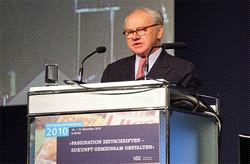Business News
Print is back

Wednesday 08. December 2010 - "The glum expression that I wore a year ago is gone." On Thursday in Berlin, VDZ President Hubert Burda welcomed guests with these words at the Annual Conference of the Association of German Magazine Publishers VDZ. He announced that advertising revenues rose by three to four percent in 2010, and sales were stable. "Print is back," said the publisher emphatically.
At the launch of the two-day industry get-together, which was attended by a record 950 delegates, Hubert Burda did more than look optimistically to the future. He also leveled strong criticism at Google and its market bahavior, saying that the search machine giant paid just under a fifth of the money that was due to publishing houses through online advertising. Burda made reference to the publishing houses fundamental mistake, which he had already described as the “CPC farce” in the run-up to the VDZ event. The mistake was, Burda said, that they had been taken in by Google’s cost-per-click pricing model for online advertising. “We were naive and foolish, and we didn’t understood any of it,” he explained from the podium.
The publishing houses’ business model is based on the common marketing formula AIDA (Attention, Interest, Desire, Action). When it came to generating attention, interest and purchasing desire online, however, the publishing houses came away empty-handed. Google would only pay providers for transactions, i.e. for any purchases made (Action) – but these only comprised 18 percent of clicks. “We have allowed ourselves to be robbed of three things,” stated Burda, emphasizing his call for a fair allocation of advertising revenue (“Fair Share”) and for transparency in Google’s search algorithms (“Fair Search”), and stressed the necessity of ancillary copyright protection.
The production of content cost lots of money – something that Apple did not acknowledge accordingly either. There were big differences in the expectations of how revenues from apps would be distributed, said the VDZ President. “The next big challenge for publishers is Web TV, for which the same mistakes cannot be made.” Burda also appealed for greater unity within the industry.
More cooperation – a sentiment shared by Burda Head of Publishing, Philipp Welte, in the subsequent panel discussion: “We have to lose our bite reflex and move over to a different way of thinking. The magazine business model is healthy and has a strong future in a digital world. In the past months, however, it has become just as clear that simply transferring this model lock, stock and barrel to the digital world will not work.”
Welte explained that it doesn’t necessarily have to be editorial websites that contribute reach for marketing packages. At Burda, he said, although 25 percent of revenues comes from digital markets, the websites have little editorial content. “Does every magazine actually have to be represented online with its own website and content? I don’t think so, which is why we have consolidated our activities in this area.” With Tomorrow Focus AG, the Burda Group has one of the biggest and best online marketing companies and can put together cross-media communication packages from print and online advertising for advertising customers.
The VDZ flagship event in Berlin ended on Friday afternoon. The association’s traditional Publishers’ Night took place on Thursday evening. Those honored with awards this year included German presidential candidate Joachim Gauck (Lifetime Achievement), Linde CEO Wolfgang Reitzle (Businessman of the Year), Bertelsmann’s Liz Mohn (Integration) and President of the EU Commission José Manuel Barroso (European of the Year). The Lebanon charity project initiated by Germany’s Young Order of Malta received the Golden Victoria for social commitment.
